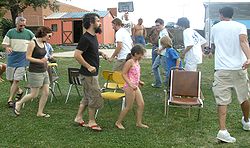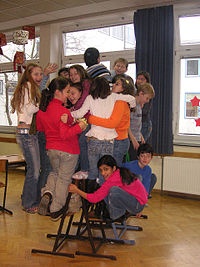- Musical chairs
-
"Trip to Jerusalem" redirects here. For the public house in Nottingham, see Ye Olde Trip To Jerusalem.For other uses, see Musical chairs (disambiguation).
Musical chairs is a game played by a group of people (usually children), often in an informal setting purely for entertainment such as a birthday party. The game starts with any number of players and a number of chairs one fewer than the number of players; the chairs are arranged in a circle (or other closed figure if space is constrained; a double line is sometimes used) facing outward, with the people standing in a circle just outside of that. A non-playing individual plays recorded music or a musical instrument. While the music is playing, the players in the circle walk in unison around the chairs. When the music player suddenly stops the music, everyone must race to sit down in one of the chairs. The player who is left without a chair is eliminated from the game, and one chair is also removed to ensure that there will always be one fewer chair than there are players. The music resumes and the cycle repeats until there is only one player left in the game, who is the winner.
Contents
Other meanings
"Playing musical chairs" is also a metaphorical way of describing any activity where items or people are repeatedly and usually pointlessly shuffled among various locations. It can also refer to a condition where people have to expend time searching for a resource, such as having to travel from gasoline station to gasoline station when there is a shortage. It is also used to refer to political situations where one leader replaces another, only to be rapidly replaced in turn due to the instability of the governing system (see cabinet shuffle).
"Musical chairs" is or was formerly also known as "Going to Jerusalem". Laura Lee Hope describes it under that name in chapter XIII of The Bobbsey Twins at School, as does John P. Marquand in chapter XXXI of Wickford Point.
In the musical Evita, during the song "the art of the possible", Juan Perón and a group of other military officers play a game of musical chairs which Perón wins, symbolizing his rise to power.
In mathematics, the principle that says that if the number of players is one more than the number of chairs, then one player is left standing, is the pigeonhole principle.
Versions
Instead of using chairs, one version of the game has players sit on the ground when the music stops, the last to sit being eliminated. This is known as 'musical bumps'. In 'musical statues', players stop moving when the music stops, and stay standing in the same position. If any player is seen moving, they are out of the game.
In the non-competitive version of "musical chairs" one chair but no player is eliminated in each round. All players have to "sit down" on the remaining chairs, while their feet must not touch the floor.
A Cold Wind Blows is another non-competitive substitute for "musical chairs."
Extreme Musical Chairs: The set up is the same as traditional musical chairs. Before the players sit down they must complete a task that the music person gives out before each round. For example before sitting in a chair, players must do five jumping jacks or run and touch the wall. Another variation is to have the players hop, jump, walk backwards, or dance while they are walking around the chairs.
In 2011, it was reported that the CW television network was developing a reality show called Extreme Musical Chairs. The premise of the show would feature contestants in a "physically demanding competition with multiple rounds of elimination set in an indoor obstacle course."[1]
References
- ^ Wallenstein, Andrew (2011-09-21). "CW preps 'Musical Chairs'". Variety. http://www.variety.com/article/VR1118043221?refCatId=14.
See also
Categories:- Party games
- Children's games
- Metaphors
Wikimedia Foundation. 2010.


